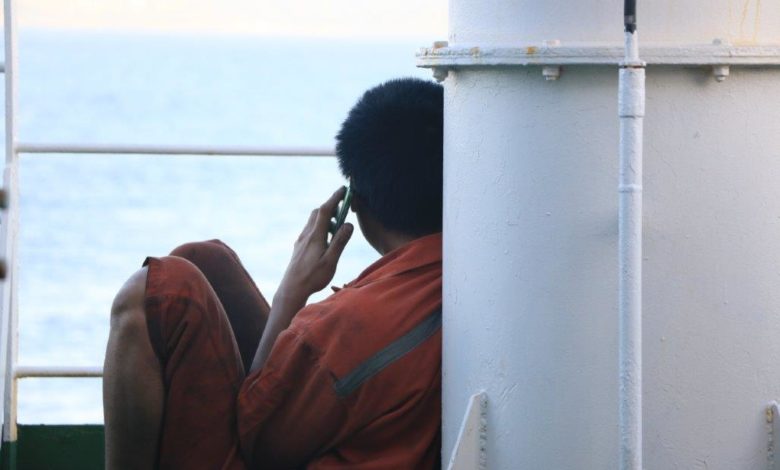New Inmarsat report highlights seafarer concerns in the digital era

A new report published by sat comm giant Inmarsat in association with UK consultancy Thetius makes clear the worries many in shipping have about job security in the digital age.
The 41-page report carries the views of a widespread range of personnel involved in shipping, both ashore and at sea.
In a standout finding, the report informs that over one in three seafarer choose personal access to digital technology as the key factor when considering a new employer. As an inducement, internet access ranks higher than pay, which was chosen by fewer than one in four respondents.
The Seafarer Happiness Index (SHI) for Q1 2022 indicated crew well-being dropping to its lowest level since the SHI was founded in 2015, with limited access to basic internet connectivity given as a primary cause.
Amendments to the Maritime Labour Convention (MLC) announced last month make crew connectivity mandatory, something that has been discussed and debated in shipping circles for more than a decade.
Ben Palmer, president of Inmarsat Maritime, said: “The inclusion of mandatory internet access to the Maritime Labour Convention in May represents a paradigm shift for seafaring rights, putting into law what responsible owners already fully understand: high-quality onboard internet has become a key indicator of crew welfare and hence recruitment and retention of high quality personnel. Today, it also provides the basis for new and exciting next-generation job roles at sea, as well as supporting safer operations, greater sustainability and productivity gains.”
Half of the seafarers responding expect job opportunities to decline by 25% within five years
The Inmarsat report also highlights the way seafarers see risks in the wider deployment of digital technologies. Half of the seafarers responding expected job opportunities to decline by 25% within five years.
“If half of our seafarers believe that traditional job opportunities at sea are disappearing, as this research suggests, more needs to be done to highlight how digitalisation will help jobs to evolve or create entirely new roles,” said Matthew Kenney, head of research and intelligence at Thetius. “Digital tools and connectivity can create happier and more productive ships, while newer, better ways of working are possible. Instead of allowing maritime professionals to become distrustful or even fearful of digital and emerging technologies, the sector must recognise the continued importance of human capital and work hard to bring crews along on the journey.”
Two in five crew members working with digital technology at sea today point to shortcomings in systems design and lack of user friendliness. The figure suggests a group of users with frustrated expectations and a progressive mindset which owners seeking to retain maritime professionals would do well to consider.
“Considering the user fully is critical to providing value-adding digital resources,” the report stresses. This is especially true for data collection tools that require human input, such as GHG reporting software. If the interface is poorly designed, the system is not intuitive, or is time consuming or complicated to understand, there is a much greater risk of reducing data quality, the study suggests, warning: “In many cases, reliance on low quality data can be catastrophic to achieving the core aims of a digital transformation strategy.”
In terms of future training, the report pointed out that there will need to be continuous upskilling of the maritime workforce, which will also require industry stakeholders to close the gap in the training, development, and retention of seafarers.
Among the report’s conclusions are a call for more to be done to ensure that human factors are considered properly in the design of digital maritime systems and to ensure the seafaring workforce is properly invested into the digitisation process.
“The challenge is made greater by the fact that seafarer happiness is at an all time low,” the study concedes.
